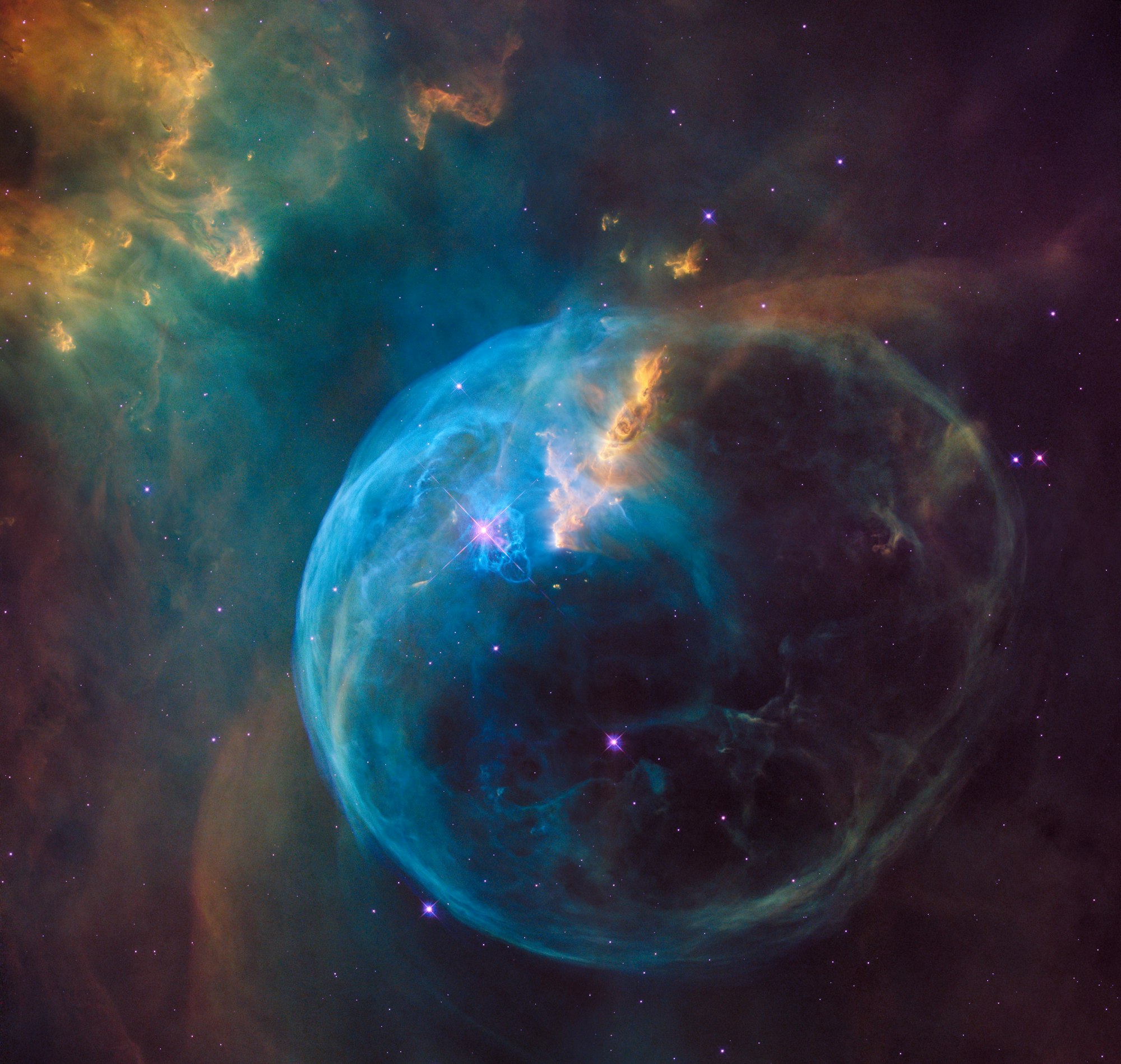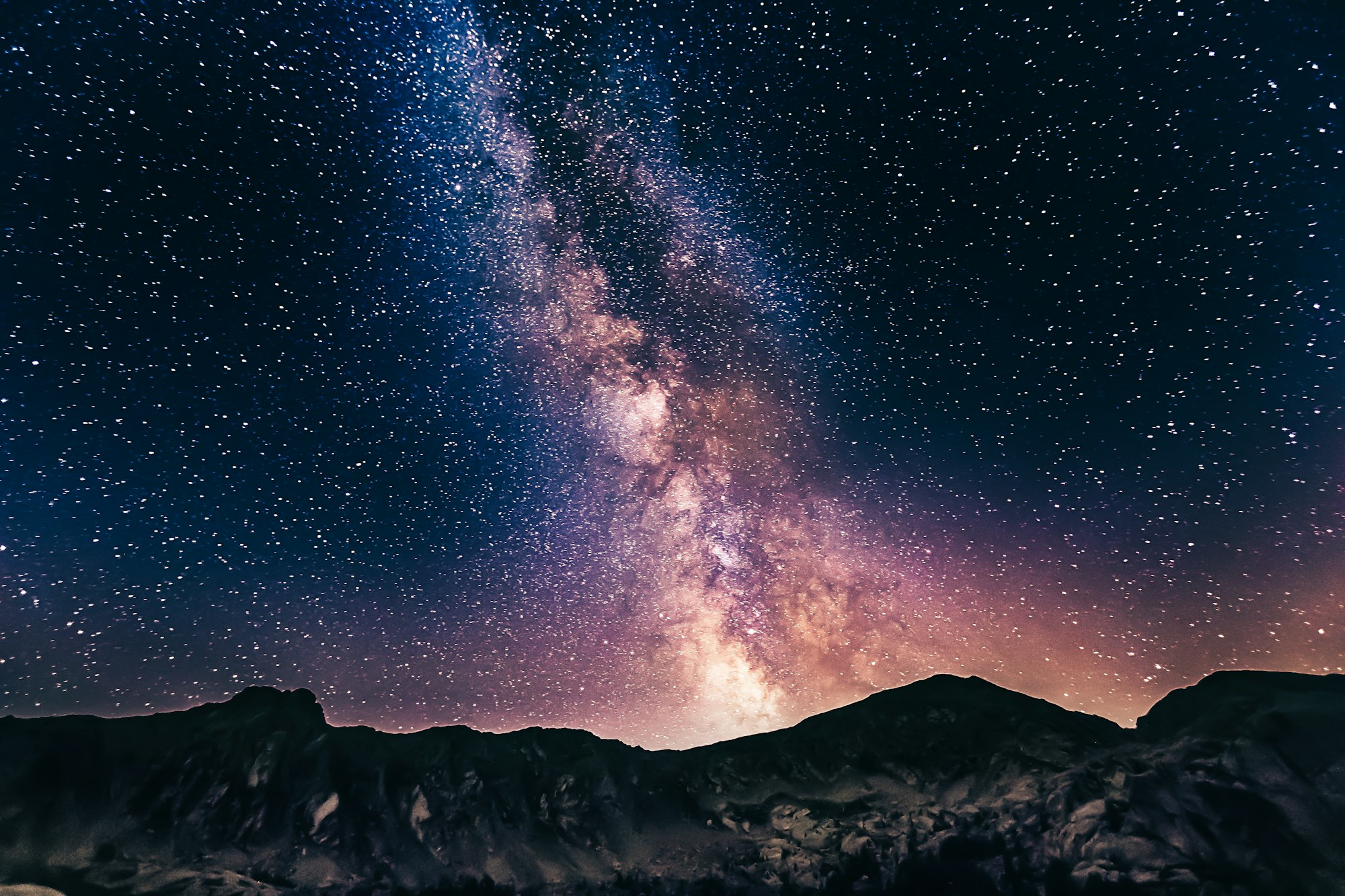
Movies and The Marginalian: Insights into what we're all made of
One of my favorite sci-fi movies is Luc Besson's Lucy, which is a wonderful romp about an empowered woman who didn't sign up for, but got, eternity, after colonizing her brain to 100%.
The Parisian police detective who accompanied her on her journey to immortality walked into a room where she had just completely disappeared, having reached that 100%. He asked where she was.
His phone buzzes, and the words I AM EVERYWHERE appear.
Actually there's a lot of truth to that. We really are everywhere, in more ways than one, and in ways that may make us squirm a bit.
I had a rather EWWW reaction when I read that I still carry the DNA of every man with whom I had sex. It's not true. But it did get me thinking.
It made me wonder how much of each of us is breathed in from all the rest of us in this compressed atmosphere which we all share. Forget about the controlled atmospheres of airplanes.
Space presses down upon us just outside those outer layers. What air there is, we all breathe. Given that we are all losing cells all the time, and bacteria which were once part of us is likely to end up in someone else's nostrils and then their lungs, doesn't that mean, in some way, that we are always and forever exchanging bits and parts of ourselves with each other?
That's just part of it.

Carl Sagan had an idea that we were made of star-stuff.
"We are a way for the universe to know itself. Some part of our being knows this is where we came from. We long to return. And we can, because the cosmos is also within us. We're made of star stuff," Sagan famously stated in one episode.
There are a good many religious doctrines which argue that all of us are one. That, unfortunately, doesn't sell lipstick and fake Ozempic injections. The Zen-ish ideas which invite us to see the universe in us in the hologram and the hologram in us in the universe is put aside in favor of the five pieces you HAVE TO HAVE this fall, and by the way, here's the new iPhone for only five thousand dollars.
We may be stardust but I fear we are stupid stardust.
At the movie's start, Lucy's disembodied voice challenges:
Life was given to us a billion years ago. What have we done with it?
Well, that's off by 2.3 billion years, if we're going to be factual. Early humans, before they began to look like us anatomically, showed up about 2-6 million years ago. Those looking more like us, maybe 300,000 years.
The Netflix program Life on Our Planet with Morgan Freeman was playing all Christmas day, not just because his voice is so damned soothing but because I also need to be reminded that we are so brief.
Our tenure, so marked by our ill treatment of the paradise we were handed, will likely not end well.
I don't know that I'll live long enough to see it.
A few weeks ago, one particular Marginalian mailing from the scholar Maria Popova caught my eye. I'd planned to write about it sooner but events have overtaken my world. A bit.
I've been completely overwhelmed with trying to manage a few things around here (this is my dining room right now, and I sleep on the couch):

Each day I have to move my goods to get out of the way of the workers, and since a lot of it is delicate that's my job. I've lost track of a great many things, but they're under the blankets somewhere.
Hell I'd like to be under the blankets hiding, for that matter.

It's all for a good cause, but right now it's hard to locate my sanity, which was already difficult to locate. I hate messes, and the smell of paint gives me migraines. But there's no place to go, so I burn sage and do my best.
I had all kinds of articles I wanted to write. Many got sidelined. This one was really important so I hung on to the idea.
Then Netflix put Lucy on again, and a few things swirled into focus. Ignore the bad science. The idea that once she colonized all of her brain, she became part of all and everything- that was intriguing.
It fit with the quote from Popova's newsletter. This is so profound it's worth sharing the whole of it here:
And then, as a faint smile washes across her face, she does die. Lightman writes:
At that moment, there were 3,147,740,103,497,276,498,750,208,327 atoms in her body. Of her total mass, 63.7 percent was oxygen, 21.0 percent carbon, 10.1 percent hydrogen, 2.6 percent nitrogen, 1.4 percent calcium, 1.1 percent phosphorous, plus a smattering of the ninety-odd other chemical elements created in stars.
In the cremation, her water evaporated. Her carbon and nitrogen combined with oxygen to make gaseous carbon dioxide and nitrogen dioxide, which floated skyward and mingled with the air. Most of her calcium and phosphorous baked into a reddish brown residue and scattered in soil and in wind.
But then we see that every atom belonging to her — or, rather, temporarily borrowed by her — truly does belong to everything and everyone, just as you and I are now inhaling the same oxygen atoms that once inflated Walt Whitman’s lungs with the lust for life:
Released from their temporary confinement, her atoms slowly spread out and diffused through the atmosphere. In sixty days’ time, they could be found in every handful of air on the planet. In one hundred days, some of her atoms, the vaporous water, had condensed into liquid and returned to the surface as rain, to be drunk and ingested by animals and plants. Some of her atoms were absorbed by light-utilizing organisms and transformed into tissues and tubules and leaves. Some were breathed in by oxygen creatures, incorporated into organs and bone.
In a passage evocative of the central sentiment in Ursula K. Le Guin’s spare, stunning poem “Kinship,” he adds:
Pregnant women ate animals and plants made of her atoms. A year later, babies contained some of her atoms… Several years after her death, millions of children contained some of her atoms. And their children would contain some of her atoms as well. Their minds contained part of her mind.
Will these millions of children, for generations upon future generations, know that some of their atoms cycled through this woman? It is not likely. Will they feel what she felt in her life, will their memories have flickering strokes of her memories, will they recall that moment long ago when she stood by the window, guilt ridden and confused, and watched as the tadr bird circled the cistern? No, it is not possible. Will they have some faint sense of her glimpse of the Void? No, it is not possible. It is not possible. But I will let them have their own brief glimpse of the Void, just at the moment they pass from living to dead, from animate to inanimate, from consciousness to that which has no consciousness. For a moment, they will understand infinity.
And the individual atoms, cycled through her body and then cycled through wind and water and soil, cycled through generations and generations of living creatures and minds, will repeat and connect and make a whole out of parts. Although without memory, they make a memory. Although impermanent, they make a permanence. Although scattered, they make a totality.
This passage from The Marginalian was so profound, so incredible, that I had to share it in case you're not a reader.
There's so much good reading to explore. I'll get there, you should see my book pile.
Wait. I can't find my damned book pile...
...but just this passage speaks to the imagination in a way that is impossible to express.
I feel terrible sadness when I see an animal killed by car. My heart breaks every time a bird bashes itself against my window. The losses I feel are deep and real and terrible when I read of forests that have burned and whales dead on beaches. The death of a tree in my yard is personal. When someone's dog dies my heart bursts.
I feel so much a part of all this world and of it, yet in the otherworldly beauty of the photos from my distant cousin's namesake telescope I see a future for all of us, as though all our dreams and hopes are hung like filaments among the billions of stars.
I've no clue whether such feelings are part of where are as a species right now or of having reached a point in my life where what is left for me shimmers in that way an oasis does. There, not there, a promise but not guaranteed, but guaranteed to disappear at some point. We all do.
The brevity of us as a species, the unbelievable natural power of the tiny world we inhabit, the endless unfolding beauty of life, for some reason it's all been in my face lately.
Okay, maybe not MY face, but in my face. There are changes going on which I hope will lead me to more time with animals, more time in the world again, and perhaps a way to sustain myself with a business that allows both.
It's been quite a ride these last few years, but in geological terms, not even a blink. We are nothing in geological time. I find comfort in that, reading the headlines.
I will leave you with another Popova quote:
“To study philosophy is to learn to die,” Montaigne wrote in his most famous essay as he reckoned with how to live. Indeed, we spend our lives learning to die while trying to bear our mortality, using our religions and our materialism to look away from the great unknown, to fill with myths and negations what is undeniably the supreme mystery on the other edge of existence. We may know what happens to our physical being when we die, but what happens to consciousness at the boundary of life remains the ultimate enigma.
In doing my best to live in full, feel gratitude for so many gifts and experiences, and experience such humility for the love I bear living things, perhaps I am learning how to die by learning how to truly live.
Lucy's final voice-over words in the movie are:
"Life was given to us a billion years ago, now you know what to do with it."
I have no idea. But I can hope to find out.

Dear Walkabout Saga Reader:
Thank you so much for taking a few minutes out of your life to read my work. WalkaboutSaga is an act of love and devotion, and I hope that you found value in it.
If my work appeals to you, may I kindly invite you to consider joining those Patreon supporters whose generosity keeps the gas in my tank as it were.
Such articles take time, resources, research and effort. Even a small amount of support truly helps me keep this going. In challenging times, I recognize that even a small amount is hard. Those who can give, I appreciate it. Those who cannot, I hope my words are helpful.
My purpose is to Move People's Lives. I can do more of that with your help.
Thank you.
You can explore that option here.
However you decide to partake of my writing, again, thank you.
Comments powered by Talkyard.